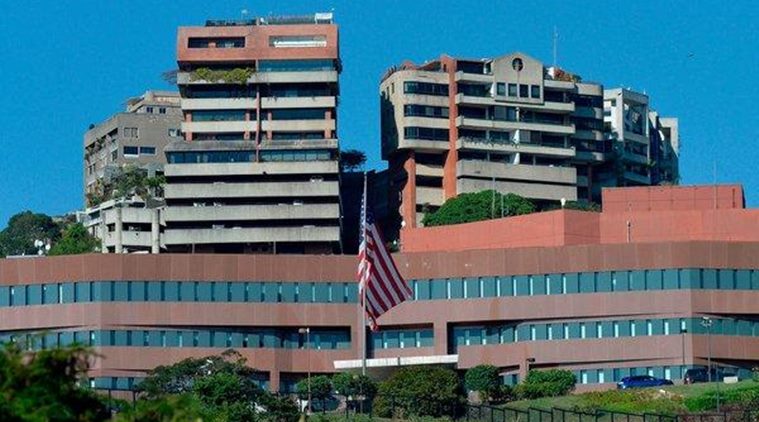
Written by Edward Wong and Daniel Victor
The United States is withdrawing all remaining diplomatic personnel from its embassy in Venezuela’s capital, Caracas, because of worsening conditions in the country, Secretary of State Mike Pompeo said late Monday. The move is a setback for the Trump administration, which had vowed to keep diplomats in the country to legitimize the opposition challenger to President Nicolás Maduro, who cut diplomatic ties with the United States in January.
Pompeo said the move reflected the “deteriorating situation” in the country and the belief that the presence of U.S. diplomats “has become a constraint on U.S. policy.” The last phrase could be read as hinting at some form of military intervention. Top administration officials have said since the start of the political standoff in January that “all options are on the table.”
Pompeo made the announcement in a Twitter post and a two-line statement released just before midnight Monday. Hours earlier, in the late afternoon, he gave a briefing on Venezuela to reporters at the State Department without mentioning any concerns about the handful of U.S. diplomats remaining in Caracas.
Because of backing from the military, Maduro has held onto power despite the hopes and expectations of opposition leaders and the Trump administration.
Last month, Juan Guaidó, the Venezuelan challenger to Maduro’s presidency, and U.S. officials tried to get senior military officers to abandon Maduro by sending convoys with food and medical supplies overland into Venezuela, forcing officers to choose between ordering soldiers to block the convoys and bar the aid to civilians or defect from the army. Officers chose to block the convoys, reinforcing Maduro’s rule and weakening the efforts of Guaidó and the United States.
Much of the country, including Caracas, has been without power for five days. Even before the blackouts, the country was struggling with violence, food shortages and the collapse of its public health system. The blackouts worsened the situation at barely functioning hospitals, where patients begged for care.
Brett Bruen, a former U.S. diplomat who has worked in Venezuela, said Pompeo’s announcement appeared hasty and lacked the details needed to make sense of what U.S. actions and policy are.
“What is our message to Guaidó’s supporters?” he said. “What should American citizens in the country do? How should other countries respond?”
He added that the Trump administration appeared to be invoking the potential use of military force much too frequently — including in Pompeo’s announcement — and he said this played into Maduro’s warnings that the United States was the actual power behind an attempted coup.
“This continues to be my main area of concern,” Bruen said. “They are using this bellicose rhetoric pretty cavalierly. It strengthens Maduro’s position without seeming to be part of an escalation strategy.”
Years of corruption, hyperinflation and a cratering economy set the conditions for a deeper crisis that began in January, when Maduro was sworn in after winning a second term in what opposition leaders and U.S. officials called a sham election. On Jan. 23, an opposition leader little known outside the country, Guaidó, head of the National Assembly, invoked the country’s constitution to declare himself the interim president. President Donald Trump recognized him, as did Canada, most Latin American nations and some European governments.
Maduro cut diplomatic ties and accused the United States of plotting to overthrow him. The Pentagon put 50 Marines on alert the next day in case the United States needed to deploy a military force to the embassy in Caracas.
Pompeo decided then to withdraw most personnel from the embassy, but said that because Guaidó was now the actual president and wanted the Americans to stay, a handful of diplomats would remain to maintain ties with the Guaidó government.